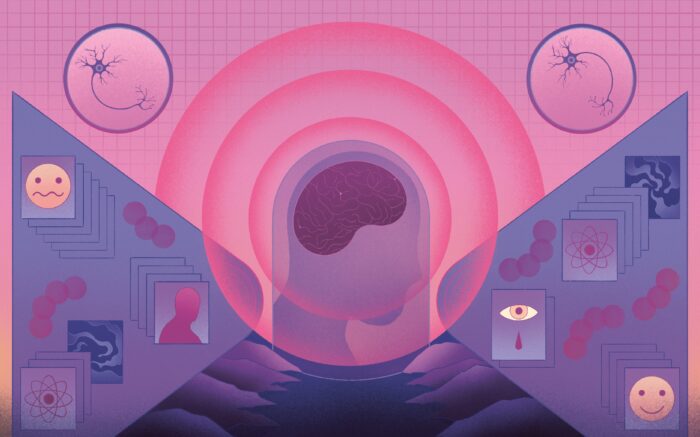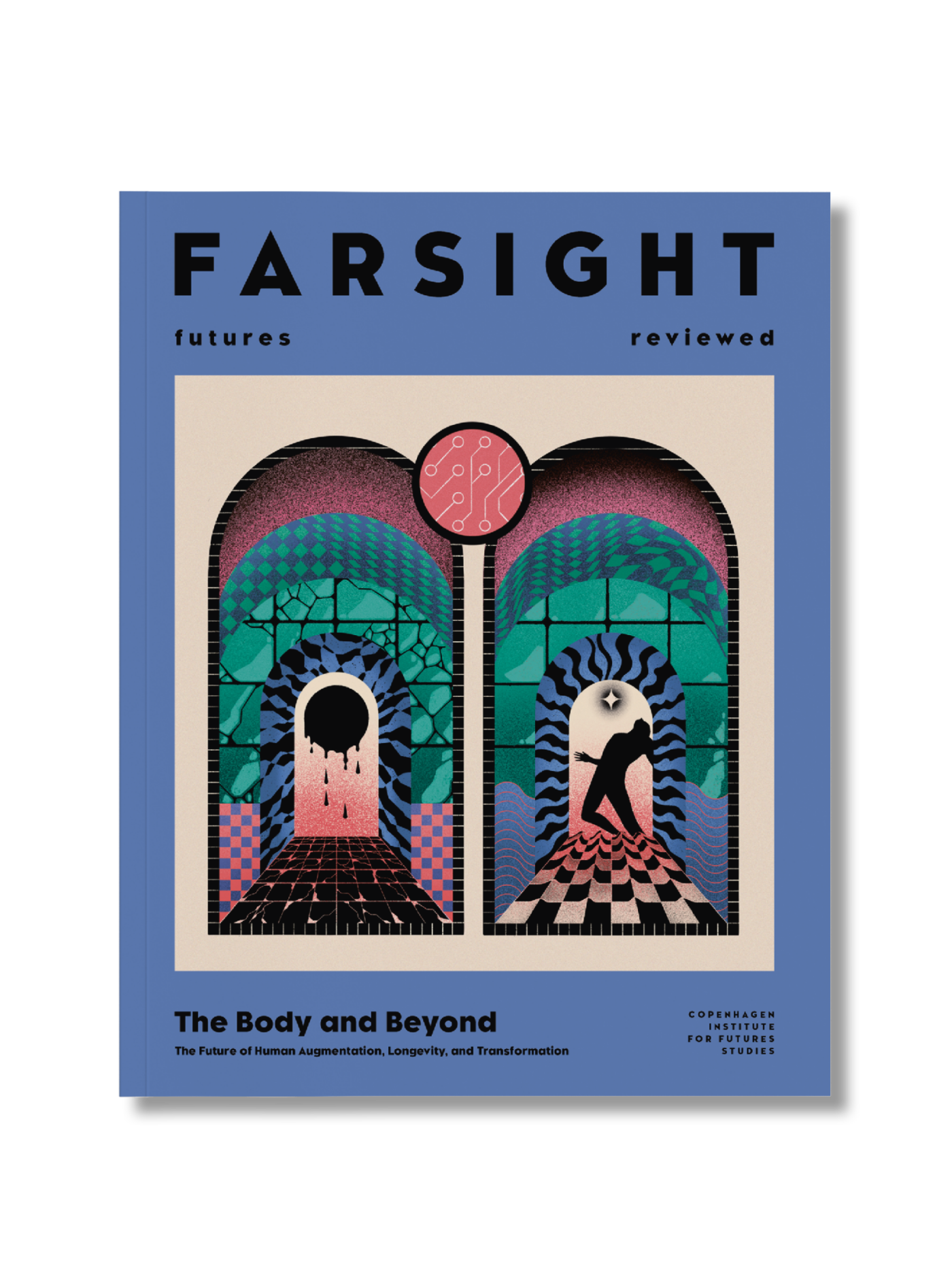
In turn, we use cookies to measure and obtain statistical data about the navigation of the users. You can configure and accept the use of the cookies, and modify your consent options, at any time.

Care work’s importance is likely to become more pronounced as low fertility rates increase the proportion of elderly people in society, imposing a greater ‘care burden’ on states and individuals in the future. So why is care work so often overlooked and undervalued?
Illustration: Sophia Prieto
All of us start off (and most of us end) our lives depending on other people’s care. Being cared for is a condition of our mental and physical health, our ability to create societal value, and the survival of our species.
Yet, this societal bedrock is generally devalued. The skills required to perform it often seen as less than and current economic measurements’ omission of it obscures its value and necessity – despite modern economies being built on its (often unpaid) availability. This neglect is anything but sustainable. Care work’s importance is likely to become more pronounced as low fertility rates increase the proportion of elderly to young people in society, imposing a greater ‘care burden’ on states and individuals.

Broaden your horizons with a Futures Membership. Stay updated on key trends and developments through receiving quarterly issues of FARSIGHT, live Futures Seminars with futurists, training, and discounts on our courses.
become a futures memberThe pressure from changing demographics is compounded by welfare states pulling back on offering quality care. This means increasingly worn-out care providers and increasing social resistance from the societal – most often minority – groups that have been expected to carry out this work. It is a development that could be met by calls to outsource human-led care work to AI and robotics in the name of economic efficiency. All of this makes the profound questions surrounding care work ever more consequential to address.
To investigate the reasons why care work is often overlooked, as well as its potential evolution, I spoke to Hanne Marlene Dahl, Professor at Roskilde University and head of the Crossroads of Care and Social Reproduction research group. “The concept of care work describes all the relations that are prerequisites for maintaining life as it exists right at this moment,” she explains. In other words, care sustains the relations between humans that are necessary both for us to survive and thrive.
At its core, the issue of overlooking care work has to do with what we assign value in an economic system. Under capitalist parameters, ‘productive’ labour refers to activities that go into the production of a product or service, or any activity that can be measured monetarily. But being able to perform such ‘productive’ labour is based on an immense amount of invisible care work that happens in our homes. Historically, Professor Dahl lays out that ‘productive’ labour has functioned on the expectation that women would perpetually offer care work “as an infinite and free resource.” This gendered aspect remains today, with the WEF estimating that 76% of unpaid care work globally is performed by women. When care work is paid, it is characterised by low wages.
While care work in the private sphere is completely absent from economic measures such as GDP, professionalised care work is seen as a net expense, making political decisions like cutting social care spending look like downright profitable for the state. This is further compounded by the inherent measurability of some of the work. As Professor Dahl explains, “Many professionalised care tasks are challenging to articulate. For example, coordinating between relatives and professional groups, or remembering that a specific elderly citizen enjoys sitting and gazing into their garden. These are things that can be difficult to put into words because we are used to describing and measuring everything. The essence of care is, in fact, its innately embodied aspect, involving personal experiences and attention to the other.”

Care requires trained skill and intuition – competencies that are praised in other parts of public and private life, but do not get the same recognition when they are related to giving care. Consider how severely your ability to ‘produce’ would be impaired if you could not get broken bones reset, if you could not go to the hospital and get your appendicitis treated, or if you did not have access to childcare or care for your ageing parents. How efficient would you be if no one cared about you?
Although the Covid-19 pandemic confronted us with the essentiality of care work in our public and private lives, it continues to be difficult for us to talk about these issues privately and politically. The explanation behind this, as Professor Dahl puts it, is that “these tasks are ones that we typically just take for granted that someone is doing”. As long as this essential work is performed in public and private, it enables society to look the other way and avoid having difficult conversations about structural inequalities in who does the work and how it is compensated.
Companies maintain their machines and equipment, the state maintains infrastructure, and homeowners maintain their property. However, societies and states do not assign the same value and importance to the maintenance of people. This, even though societies are already seeing loneliness epidemics and deteriorating mental health amongst citizens.
So – what steps could be taken to improve the acknowledgement and conditions of care work in the future? Dahl points to multiple areas that she believes should be addressed. The first is to improve the working conditions of professional care workers: “There is no doubt that this would result in greater job satisfaction, leading to better care. Trusting welfare professionals and believing in their professional judgement is crucial. By doing so, we also contribute to acknowledging their intellectual, practical, and emotional competencies,” Professor Dahl explains.
Dahl argues that explicitly acknowledging the essential role care work plays in the functioning of our society is necessary to build a future where care work is more evenly distributed and com-pensated. Key to achieving this is seeing the competencies related to care as trained skills: “There is a conflict emerging about the valorisation of traditionally feminine qualities – being available, having intuition, showing empathy – doing all this without demanding anything, or little, in return. But demands are now arising for their visibility. This is not just about wages, either – it involves broader aspects, such as actually acknowledging care in society,” Professor Dahl states.
Then there is the impact of technology, a double-edged sword that reproduces our own embedded values. On the one hand, it could enable us to do our jobs more efficiently, helping to create more free time for us to provide maintenance to the people we care about. However, it could also have a more negative effect. We do not know what the long-term consequences are of integrating AI and robotics into direct patient care. Likewise, we should question whether AI companions will be able to help us the same way that humans can. Skin-to-skin contact has been proven to have health benefits, such as lowering stress hormones and increasing serotonin. Touch calms us, and this can help our immune system work more efficiently.

Explore the world of tomorrow with handpicked articles by signing up to our monthly newsletter.
sign up hereWhile we can use technology as an aid to create more time for human-to-human contact, it also entails a risk that something fundamental to humanity could be eroded. If we fail to recognise and value care work in all its facets, this risk is arguably much larger, since we will not be fully aware of what we are sacrificing.
Perhaps we also need to reevaluate our perception of ourselves as completely independent beings – especially in societies that place significant value on the role of the individual. The view of people as inherently independent is what makes it possible for us to devalue care work as we do. Dahl elaborates on this point further: “It is deeply ingrained in us that we are fundamentally autonomous individuals who can take care of ourselves. Some see this dependency as incredibly negative, but we are mutually interdependent – whether as very young, in education, in illness, or in old age. It requires a mental shift to think of ourselves as continuously vulnerable. It is a collective denial of what is otherwise a fundamental aspect of life.”
It may be uncomfortable to think of ourselves as being dependent on care from others. When we have been taught that we are supposed to be the makers of our own destiny, recognising that we are dependent on others seems the ultimate loss of control. What if in our quest to prove ourselves as completely self-determining individuals, we have been isolating ourselves from each other? And what if we instead start viewing interconnectedness as something positive and recognise that giving care is not only a burden but can also be joyful and fulling? Maybe then, we would be able to see receiving care as something other than a weakness, and we would be brave enough to give all care work the recognition it deserves.

Stay up-to-date with the latest issue of FARSIGHT
Become a Futures Member